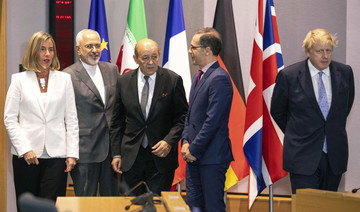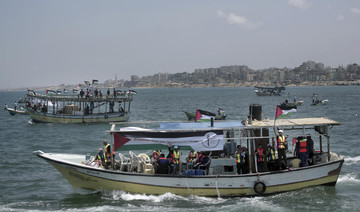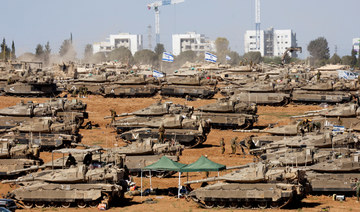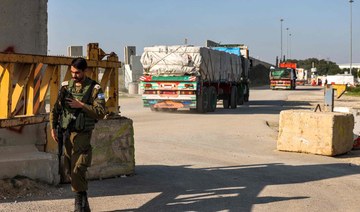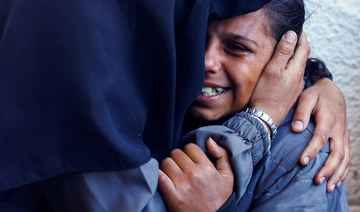JERUSALEM: Israeli Prime Minister Benjamin Netanyahu will travel to Europe Monday to push his uncompromising stance on Iran to leaders eager to salvage the nuclear agreement after the United States withdrew.
Netanyahu, a fierce opponent of the agreement and the Iranian regime, will meet in turn with German Chancellor Angela Merkel, French President Emmanuel Macron and British Prime Minister Theresa May.
Germany, France and the United Kingdom are three of the signatories of the 2015 Joint Comprehensive Plan of Action (JCPOA) between world powers and Iran, aimed at keeping Tehran from acquiring nuclear weapons.
The European leaders have been scrambling to preserve the landmark deal after slamming President Donald Trump’s May 8 decision to withdraw.
The fallout from America rejecting the accord is likely to dominate the talks, with Netanyahu expected to firmly oppose European efforts to sustain it.
“I will discuss with them ways to block Iran’s nuclear aspirations and Iran’s expansion in the Middle East,” Netanyahu said on Monday of his European meetings, noting the issues were “crucial to Israel’s security.”
After years lobbying against the 2015 deal, the decision by close ally Trump to ditch the accord has been greeted as a major triumph by Netanyahu.
The Israeli leader has brushed aside European insistence that the agreement is the best option to prevent Tehran getting the bomb, claiming that it in fact brought Tehran closer to becoming a nuclear power.
He also argues that a cash influx into Iran following the lifting of international sanctions as part of the accord has fueled the expansion of Tehran’s military influence in the region, especially in neighboring Syria.
But while the US retreat from the deal is a personal victory for Netanyahu, it also represents a leap into the unknown for Israel and the broader Middle East.
While foes Iran and Israel have been kept at bay for decades, an unprecedented May 10 escalation in Syria that saw Israel bomb alleged Iranian targets after blaming Tehran for a rocket barrage, has sparked fears of open war.
“An Iranian departure from southern Syria alone will not suffice,” Netanyahu said on Tuesday.
“The long-range missiles that Iran is working to station in Syria will endanger us even beyond the range of several kilometers from southern Syria; therefore, Iran needs to leave Syria altogether.”
The Europeans have acknowledged concerns over Iran’s regional role and its ballistic activities, but sought to maintain the JCPOA while creating a separate arrangement on these issues.
Contrary to what the US and Israel say, Europe insists the 2015 agreement works and Iran has abided by it.
“There is no alternative,” the EU’s foreign policy chief Federica Mogherini said on Monday.
Merkel, May and Macron are still waiting for the Israelis and Americans to present another way to curb Iran’s nuclear program, but are under no illusions it will happen in next week’s meetings, according to a European diplomat.
Divided on other issues, the Europeans have emphasised their cohesion on the JCPOA, fearing that ripping it up could benefit hard-liners in Iran and push Tehran to resume large-scale uranium enrichment.
If that happens, the fear is it will once again make striking Iran a real option for Israel.
On Thursday, a former Mossad chief said that in 2011 Netanyahu had ordered him and the military chief of staff to prepare an attack on Iran within 15 days.
According to Tamir Pardo’s interview on the Uvda television program, such a directive could either mean “he really means it,” or be a means to deliver a message, for example to the US, and perhaps drive it to take action.
Other major issues look set to be left on the sidelines in the talks with European leaders.
The Israeli-Palestinian conflict is in the spotlight after the worst military flare-up in Gaza since a 2014 war raised fears this week of yet another full-blown conflict in the beleaguered Palestinian enclave.
The exchange of fire came after scores of Palestinians were shot dead by Israeli troops during protests and clashes along the Gaza border.
But along with other subjects, such as bilateral relations or the rise of anti-Semitism in Europe, it will likely remain overshadowed by Iran.
Expectations of any progress on the conflict with the Palestinians are low.
Peace prospects remain as distant as ever and the diplomatic process in limbo as the sides wait for a plan long promised by the Trump administration.
Netanyahu to push hard line on Iran during Europe trip
Netanyahu to push hard line on Iran during Europe trip
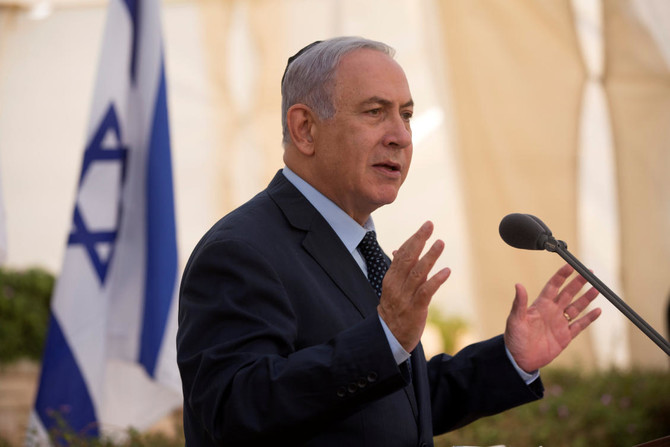
- Netanyahu will meet in turn with German Chancellor Angela Merkel, French President Emmanuel Macron and British Prime Minister Theresa May
- The European leaders have been scrambling to preserve the landmark deal after slamming President Donald Trump’s May 8 decision to withdraw
Gaza truce talks resume in Cairo ‘with all sides present’: Egypt media
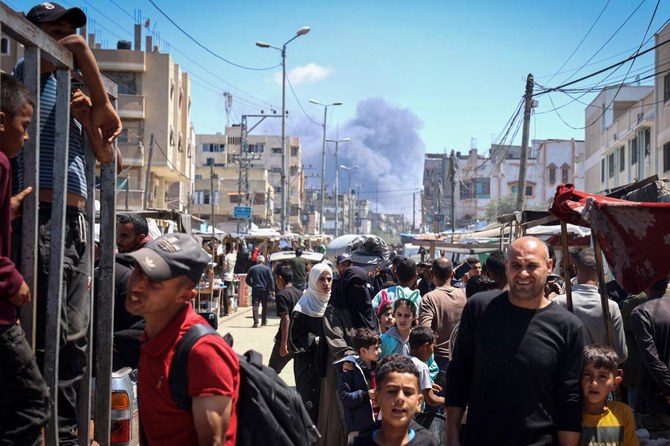
- AlQahera News: ‘Truce negotiations have resumed in Cairo today with all sides present’
“Truce negotiations have resumed in Cairo today with all sides present,” Egypt’s AlQahera News, which is close to the intelligence services, reported, citing a “senior official” it did not identify.
Mediator Qatar urges international community to prevent Rafah ‘genocide’
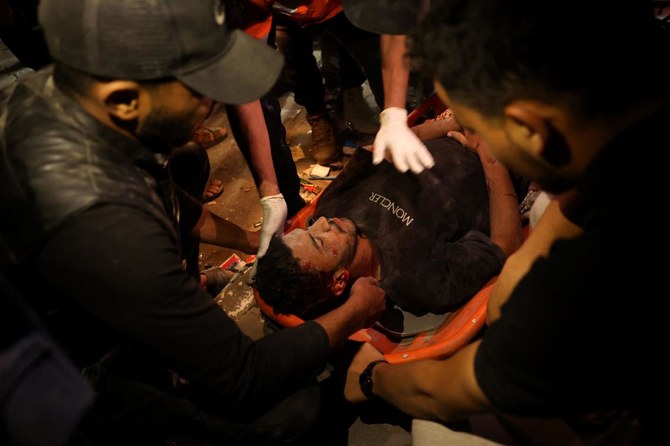
- Israel struck targets in the Gaza Strip on Wednesday after seizing the main border crossing with Egypt
- African Union condemns the Israeli military’s moves into southern Gaza’s Rafah
DOHA: Qatar called on the international community on Wednesday to prevent a “genocide” in Rafah following Israel’s seizure of the Gaza city’s crossing with Egypt and threats of a wider assault.
In a statement the Gulf state, which has been mediating between Israel and militant group Hamas, appealed “for urgent international action to prevent the city from being invaded and a crime of genocide being committed.”
Israel struck targets in the Gaza Strip on Wednesday after seizing the main border crossing with Egypt. Israel has vowed for weeks to launch a ground incursion into Rafah, despite a clamour of international objection.
The attacks on the southern city, which is packed with displaced civilians, came as negotiators and mediators met in Cairo to try to hammer out a hostage-release and truce deal in the seven-month war.
Qatar, which has hosted Hamas’s political office in Doha since 2012, has been engaged — along with Egypt and the United States — in months of behind-the-scenes mediation between Israel and the Palestinian group.
The African Union condemned Wednesday the Israeli military’s moves into southern Gaza’s Rafah, calling for the international community to stop “this deadly escalation” of the war.
AU Commission chief Moussa Faki Mahamat “firmly condemns the extension of this war to the Rafah crossing,” said a statement after Israeli tanks captured the key corridor for humanitarian aid into the besieged Palestinian territory.
Faki “expresses his extreme concern at the war undertaken by Israel in Gaza which results, at every moment, in massive deaths and systematic destruction of the conditions of human life,” the statement said.
“He calls on the entire international community to effectively coordinate collective action to stop this deadly escalation.”
Israel says it has reopened Kerem Shalom border crossing for Gaza aid
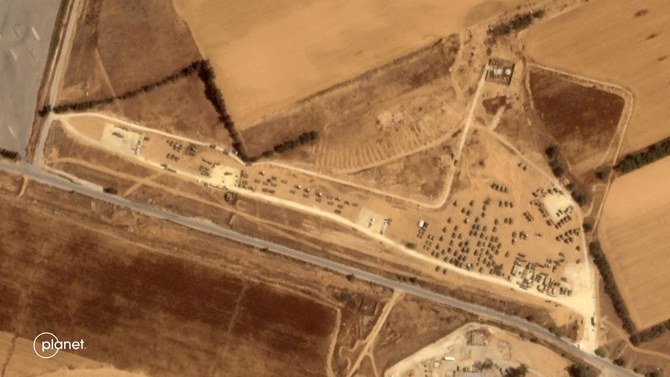
- Erez border crossing between Israel and northern Gaza is also open for aid deliveries into the Palestinian territory
JERUSALEM: Israel said it reopened the Kerem Shalom border crossing to humanitarian aid for Gaza Wednesday, four days after closing it in response to a rocket attack that killed four soldiers.
“Trucks from Egypt carrying humanitarian aid, including food, water, shelter equipment, medicine and medical equipment donated by the international community are already arriving at the crossing,” the army said in a joint statement with COGAT, the defense ministry body that oversees Palestinian civil affairs.
The supplies will be transferred to the Gaza side of the crossing after undergoing inspection, it added.
The statement said the Erez border crossing between Israel and northern Gaza is also open for aid deliveries into the Palestinian territory.
The Kerem Shalom crossing was closed after a Hamas rocket attack killed four soldiers and wounded more than a dozen on Sunday.
On Tuesday, Israeli troops seized control of the Palestinian side of the Rafah crossing between Gaza and Egypt after launching an incursion into the eastern sector of the city.
The United Nations and Israel’s staunchest ally the United States both condemned the closure of the two crossings which are a lifeline for civilians facing looming famine.
‘A blessing’: Rains refill Iraq’s drought-hit reservoirs
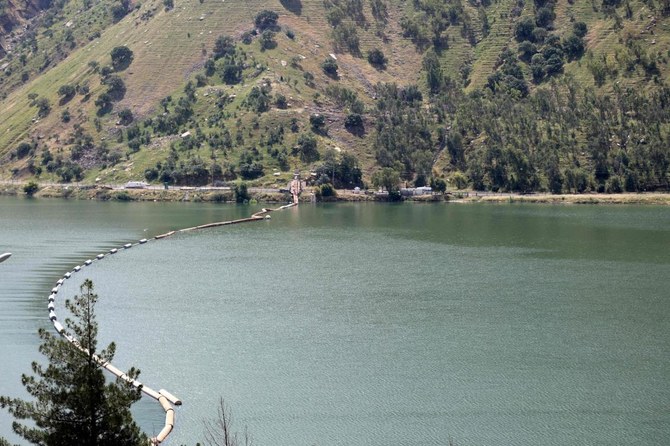
- The last time Darbandikhan was full was in 2019
- Iraq is considered by the United Nations to be one of the five countries most vulnerable to some impacts of climate change
Darbandikhan: The reservoir behind the massive Darbandikhan dam, tucked between the rolling mountains of northeastern Iraq, is almost full again after four successive years of drought and severe water shortages.
Iraqi officials say recent rainfall has refilled some of the water-scarce country’s main reservoirs, taking levels to a record since 2019.
“The dam’s storage capacity is three million cubic meters (106 million cubic feet). Today, with the available reserves, the dam is only missing 25 centimeters (10 inches) of water to be considered full,” Saman Ismail, director of the Darbandikhan facility, told AFP on Sunday.
Built on the River Sirwan, the dam is located south of the city of Sulaimaniyah in Iraq’s autonomous Kurdistan region.
“In the coming days, we will be able to say that it’s full,” said Ismail, with the water just a few meters below the road running along the edge of the basin.
The last time Darbandikhan was full was in 2019, and since then “we’ve only had years of drought and shortages,” said Ismail.
He cited “climate change in the region” as a reason, “but also dam construction beyond Kurdistan’s borders.”
The central government in Baghdad says upstream dams built in neighboring Iran and Turkiye have heavily reduced water flow in Iraq’s rivers, on top of rising temperatures and irregular rainfall.
This winter, however, bountiful rains have helped to ease shortages in Iraq, considered by the United Nations to be one of the five countries most vulnerable to some impacts of climate change.
In Iraq, rich in oil but where infrastructure is often run-down, torrential rains have also flooded the streets of Kurdistan’s regional capital Irbil.
Four hikers died last week in floods in Kurdistan, and in Diyala, a rural province in central Iraq, houses were destroyed.
Ali Radi Thamer, director of the dam authority at Iraq’s water resources ministry, said that most of the country’s six biggest dams have experienced a rise in water levels.
At the Mosul dam, the largest reservoir with a capacity of about 11 billion cubic meters, “the storage level is very good, we have benefitted from the rains and the floods,” said Thamer.
Last summer, he added, Iraq’s “water reserves... reached a historic low.”
“The reserves available today will have positive effects for all sectors,” Thamer said, including agriculture and treatment plants that produce potable water, as well as watering southern Iraq’s fabled marshes that have dried up in recent years.
He cautioned that while 2019 saw “a sharp increase in water reserves,” it was followed by “four successive dry seasons.”
Water has been a major issue in Iraq, a country of 43 million people that faces a serious environmental crisis from worsening climate change, with temperatures frequently hitting 50 degrees Celsius in summer.
“Sure, today we have rain and floods, water reserves that have relatively improved, but this does not mean the end of drought,” Thamer said.
About five kilometers (three miles) south of Darbandikhan, terraces near a small riverside tourist establishment are submerged in water.
But owner Aland Salah prefers to see the glass half full.
“The water of the Sirwan river is a blessing,” he told AFP.
“When the flow increases, the area grows in beauty.
“We have some damage, but we will keep working.”
Israel launches fresh Gaza strikes as negotiators work toward truce
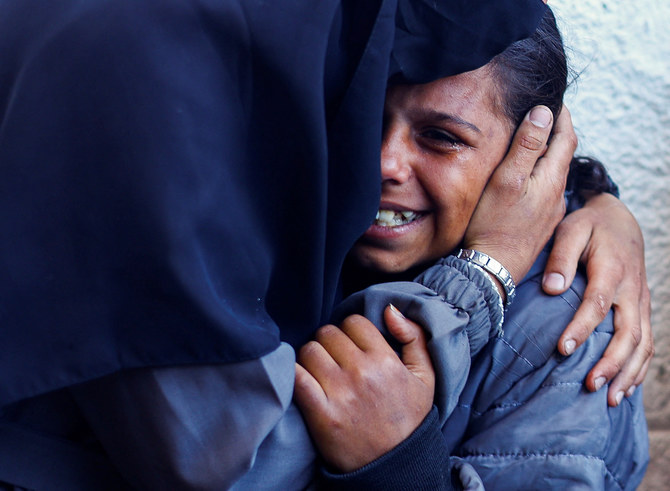
- The White House condemned the interruption to humanitarian deliveries
- One strike on an apartment in devastated Gaza City killed seven members of the same family and wounded several other people
RAFAH: Israel struck targets in the Gaza Strip on Wednesday after seizing the main border crossing with Egypt, where negotiators were working to make good on their “last chance” to cement a ceasefire deal.
After weeks of vowing to launch a ground incursion into the border city of Rafah despite international objections, Israeli tanks moved in Tuesday, capturing the crossing that has served as the main conduit for aid into the besieged Palestinian territory.
The White House condemned the interruption to humanitarian deliveries, with a senior US official later revealing Washington had paused a shipment of bombs last week after Israel failed to address US concerns over its Rafah plans.
The push into the southern city, which is packed with displaced civilians, came as negotiators and mediators met in Cairo to try and hammer out a hostage release deal and truce in the seven-month war between Israel and the militant group Hamas.
A senior Hamas official, requesting anonymity, warned this would be Israel’s “last chance” to free the scores of hostages still in militants’ hands.
Egypt’s state-linked Al-Qahera News reported Tuesday that mediators from Qatar, the United States and Egypt were meeting with a Hamas delegation.
It later reported that “all parties” including Israel had agreed to resume talks. Israeli Prime Minister Benjamin Netanyahu said earlier that his country’s delegation was already in Cairo.
Israel’s close ally and chief military backer the United States said it was hopeful the two sides could “close the remaining gaps.”
“Everybody’s coming to the table,” US National Security Council spokesman John Kirby told reporters. “That’s not insignificant.”
Rafah bombing
Despite the Cairo talks, witnesses and a local hospital reported Israeli strikes across the Gaza Strip overnight into Wednesday morning, including around Rafah.
One strike on an apartment in devastated Gaza City killed seven members of the same family and wounded several other people early Wednesday, the Al-Ahli hospital said.
Israel’s Rafah operation began hours after Hamas announced late Monday it had accepted a truce proposal — one Israel said was “far” from what it had previously agreed to.
Still, the announcement prompted cheering crowds to take to the streets in Gaza, though Rafah resident Abu Aoun Al-Najjar said the “indescribable joy” was short-lived.
“It turned out to be a bloody night,” he told AFP, as more Israeli bombardments “stole our joy.”
Taking control of Rafah crossing
Israeli army footage showed tanks taking “operational control” of the Palestinian side of the Rafah crossing on Tuesday.
Netanyahu described the operation as “a very important step” in denying Hamas “a passage that was essential for establishing its reign of terror.”
But UN humanitarian office spokesman Jens Laerke said Israel had also denied his organization access to both Rafah and Kerem Shalom — another major aid crossing on the border with Israel.
UN Secretary-General Antonio Guterres urged Israel to “immediately” reopen both crossings, calling the closures “especially damaging to an already dire humanitarian situation.”
White House Press Secretary Karine Jean-Pierre offered a similar view, calling the closures “unacceptable.”
She said the Kerem Shalom crossing was expected to reopen on Wednesday.
Hours later, a senior Biden administration official speaking on condition of anonymity revealed the United States had “paused one shipment of weapons last week” after Israel failed to address its concerns over the Rafah incursion, which Washington has vocally opposed.
The shipment had consisted of more than 3,500 heavy-duty bombs, the official said.
It was the first time that Biden had acted on a warning he gave Netanyahu in April — namely that US policy on Gaza would depend on how Israel treated civilians.
The US official said Washington was “especially focused” on the use of the heaviest 2,000-pound (907 kilogram) bombs “and the impact they could have in dense urban settings.”
However, the official added: “We have not made a final determination on how to proceed with this shipment.”
The Pentagon, meanwhile, said the US military had completed construction of an aid pier off Gaza’s coast, but weather conditions mean it is currently unsafe to move the two-part facility into place.
The US Central Command announced its leader, General Michael Erik Kurilla, had been in Egypt on Monday and Tuesday to “gain a deeper understanding of the perspectives of Egyptian military leaders on regional security and the status of humanitarian aid.”
Rising death toll
The war in Gaza was sparked by Hamas’s unprecedented October 7 attack on Israel, which resulted in the deaths of more than 1,170 people, mostly civilians, according to an AFP tally of Israeli official figures.
Vowing to destroy Hamas, Israel launched a retaliatory offensive that has so far killed at least 34,789 people in Gaza, mostly women and children, the Hamas-run territory’s health ministry said Tuesday.
Militants also took around 250 people hostage on October 7, of whom Israel estimates 128 remain in Gaza, including 36 who are believed to be dead.
Defense Minister Yoav Gallant said Israel might “deepen” its Gaza operation if negotiations failed to bring the hostages home.
“This operation will continue until we eliminate Hamas in the Rafah area and the entire Gaza Strip, or until the first hostage returns,” he said in a statement.
Egypt and Qatar have taken the lead in the truce talks, with Hamas saying Monday it had told officials from both countries of its “approval of their proposal regarding a ceasefire.”
Hamas member Khalil Al-Hayya told the Qatar-based Al Jazeera news channel that the proposal involved a complete Israeli withdrawal from Gaza, the return of Palestinians displaced by the war and a hostage-prisoner exchange, with the goal of a “permanent ceasefire.”
Netanyahu’s office called the proposal “far from Israel’s essential demands,” but said the government would still send negotiators to Cairo.
International alarm has been building about the consequences of an Israeli ground invasion of Rafah, where the United Nations says 1.4 million people are sheltering.
But Netanyahu had repeatedly vowed to send in ground troops regardless of any truce, saying Israel needs to root out remaining Hamas forces.
Aid groups have warned that the coastal “humanitarian area” of Al-Muwasi — where Israel’s military told people to go before it launched its Rafah operation — is unprepared to handle the influx.


